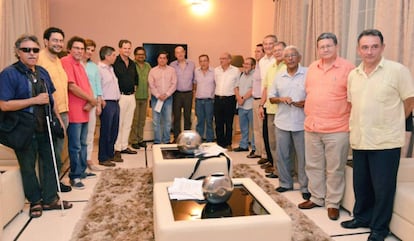Colombian government and FARC rebels conclude peace talks
Official announcement expected on Wednesday in Havana, with signing ceremony to take place in September in Colombia

After a process lasting four years, the Colombian government and leftist FARC rebels have satisfactorily ended their negotiations on a peace deal aimed at ending the South American country’s decades-long conflict, sources close to both sides said on Tuesday.
An official announcement will be made on Wednesday afternoon in the Cuban capital of Havana, said the Colombian government’s High Commissioner for Peace.
For the last week, government negotiators have been working around the clock on the details of the final agreement, with just a few technical points to be ironed out.
The FARC will now put the peace deal before the grassroots of the organization. The idea is for the FARC to become a political party
“The day is coming,” wrote both the High Commissioner and the FARC in respective tweets, accompanied by a photograph of members of the two delegations smiling.
However, the announcement has generated confusion. Unofficially, sources on both sides had insisted that the talks had finished. But with a few details still to be addressed, no official announcement about a definitive agreement could be made until Wednesday. But both sides agree that any details still pending would not endanger the accord.
On June 22, both sides signed a “bilateral and definitive” ceasefire. The following day Colombia’s president, Juan Manuel Santos, FARC leader Rodrigo Londoño and other Latin American leaders attended a ceremony in Havana to mark the historic step.
Since then, both sides have been working on a timetable, disarmament, security guarantees for guerrillas, and justice for victims of abuses committed by both sides. They have also discussed designating zones where the FARC’s estimated 7,000 remaining fighters can gather for a UN-supervised demobilization process, all of which is expected to take up to a year to implement. Throughout the negotiations, the FARC has demanded guarantees that its forces will be protected after they lay down their arms.
The biggest obstacle to a final deal has been finding ways to give it legal force so that it will not unravel should a more conservative government succeed Santos, who leaves office in 2018.
Santos has vowed to put the deal to a referendum so Colombians can express their opinion. Polls show the FARC are widely disliked among conservative Colombians who question the peace process and criticize the government's “willingness to make concessions” to the rebels.
The most vocal critic is former president Álvaro Uribe, who argues the rebels are “getting away with murder,” referring to the amnesty offer for rebels willing to confess their crimes.
For the last week, government negotiators have been working round the clock on the details of the final agreement, with just a few technical points to be ironed out
But the FARC insists that an amnesty be part of any final agreement.
Colombia has been in conflict since a rural uprising began in the 1960s. It has included a number of leftist rebel groups, right-wing paramilitaries and drug cartels.
Human rights groups say atrocities have been committed by all sides, and an estimated five million people displaced. Many families are still searching for missing loved ones.
On Monday, Iván Márquez, the guerrilla’s chief negotiator, sent a tweet with a photograph showing Colombia’s foreign minister and two other Cabinet members and senior politicians, alongside FARC negotiators around a table filled with papers, coffee cups, bottles of water and computers, providing a positive image of the working groups ironing out details. The FARC’s leader, known as Timochenko, replied with a tweet saying: “We are at the gates of important announcements that will take us to the final agreement.”
Santos has been pushing both sides to conclude the talks so he can call the referendum sometime in the first half of October before he announces major tax reforms.
The FARC will now take the peace deal to an congress where it will be put before the grassroots of the organization. The idea is for the FARC to become a political party.
A signing ceremony is expected to take place in Colombia before the referendum, to be attended by leaders from the region, in a bid to persuade voters to back the peace deal.
English version by Nick Lyne.
Tu suscripción se está usando en otro dispositivo
¿Quieres añadir otro usuario a tu suscripción?
Si continúas leyendo en este dispositivo, no se podrá leer en el otro.
FlechaTu suscripción se está usando en otro dispositivo y solo puedes acceder a EL PAÍS desde un dispositivo a la vez.
Si quieres compartir tu cuenta, cambia tu suscripción a la modalidad Premium, así podrás añadir otro usuario. Cada uno accederá con su propia cuenta de email, lo que os permitirá personalizar vuestra experiencia en EL PAÍS.
¿Tienes una suscripción de empresa? Accede aquí para contratar más cuentas.
En el caso de no saber quién está usando tu cuenta, te recomendamos cambiar tu contraseña aquí.
Si decides continuar compartiendo tu cuenta, este mensaje se mostrará en tu dispositivo y en el de la otra persona que está usando tu cuenta de forma indefinida, afectando a tu experiencia de lectura. Puedes consultar aquí los términos y condiciones de la suscripción digital.









































